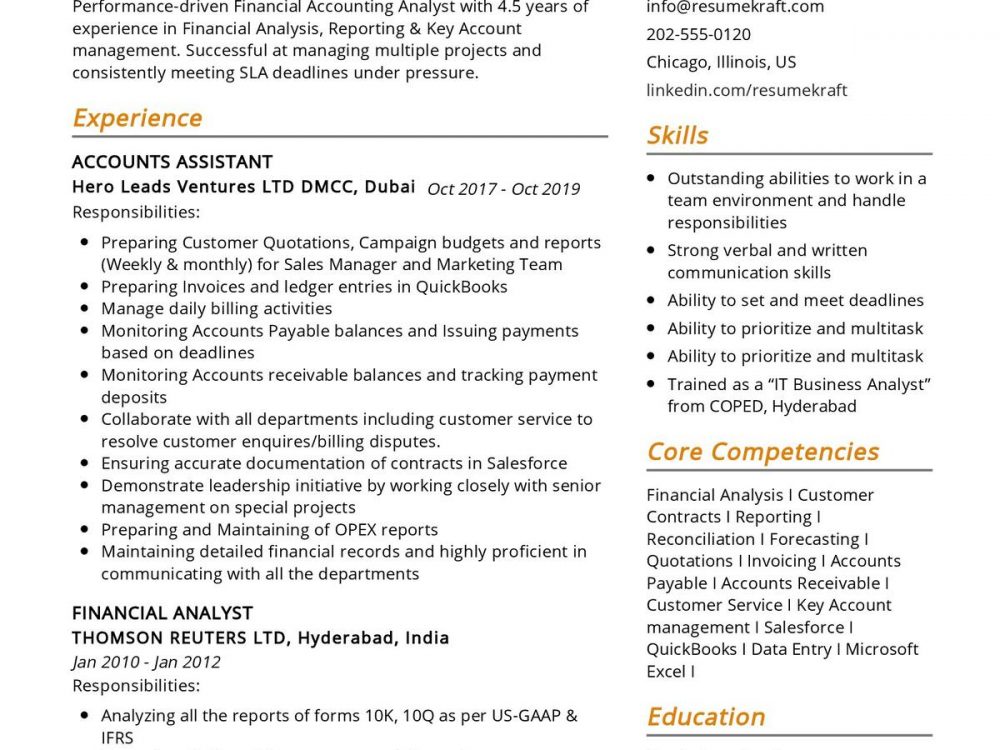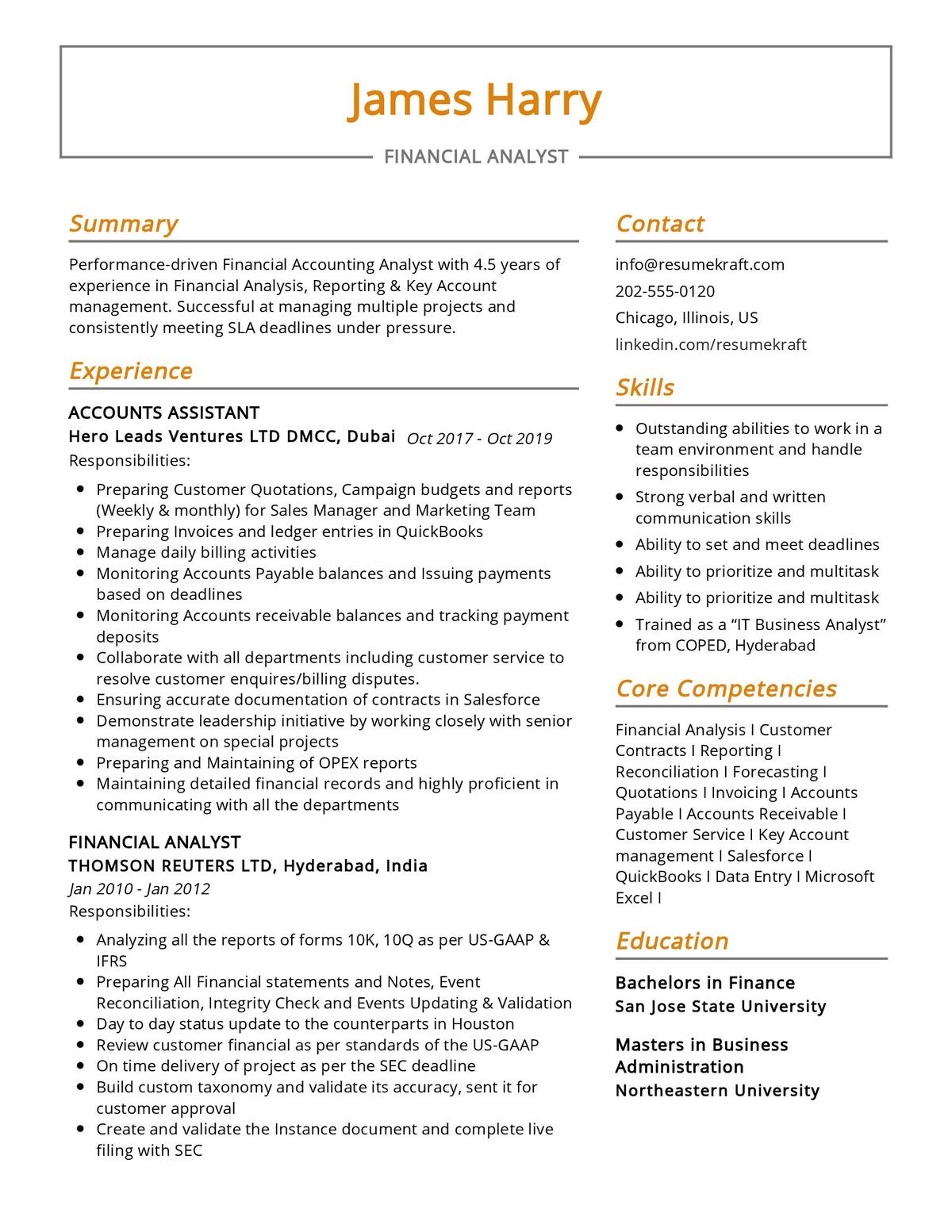What Should Be Included In A Financial Analyst Resume?
Crafting a successful resume for a financial analyst role is an important step in the job search process. The most effective financial analyst resumes will be tailored to the industry and the particular company you’re applying to, but all should include the same basic components.
When writing a financial analyst resume, it’s important to start with a summary statement that outlines your main qualifications. This should include your technical and soft skills, as well as any specialties you bring to the table. Be sure to highlight any certifications you have, such as Chartered Financial Analyst (CFA) or Certified Financial Planner (CFP).
You should also include a detailed list of your professional experience, outlining relevant positions held and the skills and competencies you gained in each. Provide examples of your accomplishments in each role, such as the successful implementation of a new financial system or the development of an improved budgeting process.
In addition to professional experience, your financial analyst resume should list any educational qualifications and relevant course work completed. And, if you have any publications related to the field, be sure to include them.
Finally, you should include a list of any relevant associations or organizations you’re involved in, as well as any awards or recognition you’ve earned. Doing so will show potential employers that you are dedicated to your field and are highly knowledgeable about the industry.
By including all of these components, your financial analyst resume will be comprehensive and give potential employers an informed overview of your skills and experience.
What Skills Should I Put On My Resume For Financial Analyst?
When writing a resume for a financial analyst position, it is important to include skills that will make you stand out to potential employers. The skills you include should demonstrate that you are able to think critically about financial information, analyze data, and make decisions based on that data. In addition, you should have the ability to present complex concepts in an accessible manner.
Some important skills that a financial analyst should have on their resume include:
- Analytical Skills: As a financial analyst, it is essential to understand and effectively analyze financial data. This includes comprehending accounting principles, forecasting, and investment analytics.
- Problem-Solving Skills: Financial analysts must be able to identify problems, develop solutions, and make decisions based on those solutions.
- Research Skills: To be successful, financial analysts must be able to conduct research and identify trends to provide actionable insight.
- Communication Skills: Financial analysts must be able to effectively communicate findings to colleagues and clients. This includes the ability to write concisely and explain complex financial concepts.
- Technical Skills: Financial analysts should be proficient in using financial software and be able to leverage automation to increase their efficiency.
By including these skills on your resume, employers will immediately recognize your qualifications and be more likely to hire you. Showcasing your skills in these areas will be beneficial to your job prospects as a financial analyst.
What Is The Job Description Of The Financial Analyst?
Financial analysts play a key role in helping companies make important decisions about their finances. They are responsible for analyzing and interpreting data to assess the financial performance of a company and provide advice on how to improve it. Financial analysts also provide advice on investments, such as stocks and bonds, and on how to manage risk.
To become a financial analyst, you need to be highly educated in economics and finance. You should have a degree in finance, accounting, or economics and must be proficient in mathematics and statistics. You should also be familiar with financial analysis tools and software.
The job of a financial analyst entails working with a variety of different data and information. You must be able to analyze and interpret this data to assess the financial performance of a company. You must also be able to use your skills to advise on investments and other financial decisions. Additionally, you must be able to communicate your findings and conclusions to the company’s management.
Finally, financial analysts must have excellent problem-solving skills and the ability to think critically and logically. They must also be detail-oriented and organized. A financial analyst must be able to work independently and as part of a team, and must be comfortable working with complex information. Good communication and interpersonal skills are also essential for this position.
What Is A Good Objective For A Financial Analyst Resume?
A good objective for a Financial Analyst Resume should focus on key skills, abilities, and accomplishments. It should clearly define the position and emphasize qualifications that make the candidate the best fit for the job. For example, a Financial Analyst may have experience in cash flow management, budgeting, financial forecasting, and capital investments, so it is important to make sure these particular qualifications are highlighted. Additionally, a Financial Analyst should be able to demonstrate technical and analytical abilities, as well as strong communication skills. Being able to work in a team environment is also highly valued.
In a resume objective, it is important to emphasize the value the candidate can bring to the company. Showcasing leadership skills, attention to detail, and an ability to work with people of different backgrounds and levels of experience can make a candidate stand out from the crowd. Additionally, it is important to express the ability to learn quickly and stay up-to-date with the latest industry trends and best practices.
When writing a resume objective, use language that shows confidence and enthusiasm. It should be concise, but still provide enough detail for the reader to understand the candidate’s qualifications and accomplishments. It is important to be honest and make sure to avoid making any false claims. With the right objective, a Financial Analyst can make a great first impression with potential employers.
What Are The Career Prospects In The Financial Analyst?
The career prospects of a financial analyst are vast and highly rewarding. Financial analysts play an integral role in the management of finances for many businesses and organizations. They are responsible for analyzing and evaluating financial information and developing strategies and plans to help their companies increase profits. With the right combination of financial knowledge, strong analytical skills, and technical expertise, financial analysts can help achieve organizational goals and objectives.
Financial analysts typically work in private industries, such as banking and finance, as well as in government and non-profit organizations. Their duties may include developing financial models, analyzing complex financial data, preparing reports and presentations, and making recommendations on investment and financial decisions. As a financial analyst, you can expect to have a high level of responsibility and be in demand as a business consultant or advisor.
Financial analysts must possess strong quantitative, analytical, communication, and problem-solving skills. A bachelor’s degree in finance, economics, accounting, or a related field is typically required for entry-level positions. Many financial analysts also have a master’s degree in finance or a related field. It is important to have extensive knowledge of financial markets and trends, as well as knowledge of accounting and investment strategies.
Financial analysts can expect to see job growth in the coming years, as businesses continue to search for qualified professionals to handle their financial operations. The U.S. Bureau of Labor Statistics (BLS) projects that the demand for personal financial advisors and financial analysts will grow by 11% from 2020 to 2030, which is faster than the average for all occupations.
The salary for financial analysts can vary widely depending on experience, education, and the type of industry in which they work . Entry-level financial analysts typically have a bachelor’s degree in finance, accounting, economics, or a related field. With adequate experience and education, financial analysts can move up to mid-level and senior-level positions, which often require a master’s degree in finance or a related field. Having extensive knowledge of financial markets and trends.
Key Takeaways for an Financial Analyst resume
When it comes to crafting a top-notch financial analyst resume, there are several key takeaways to keep in mind. First and foremost, it is essential that your resume accurately reflects your qualifications and accomplishments for the role. Before submitting a resume, it is important to double-check for spelling and grammar errors, as well as be sure to include the most relevant and up-to-date information.
When writing your resume, be sure to list your most impressive qualifications and accomplishments first, as this will make it easier for the employer to quickly scan the document and understand your experience. Include details such as technical skills, the names of the companies you’ve worked for, and any certifications or professional licenses you possess. Be sure to include any relevant data analysis and statistical modeling experiences you have as well.
In addition, as a financial analyst, you should also showcase your problem-solving and decision-making skills in your resume. For this, highlight any projects you’ve completed and the strategies you used to reach solutions. Additionally, include any presentations or reports you’ve written, and don’t forget to mention any awards or recognition you’ve earned.
Finally, make sure you highlight any extra knowledge or skills you possess that could set you apart from other candidates. This might include knowledge of different programming languages, prior experience leading a team, or a proficiency in Excel. Highlighting these additional skills and experiences can help you stand out from the competition and make you an attractive candidate for the role.


